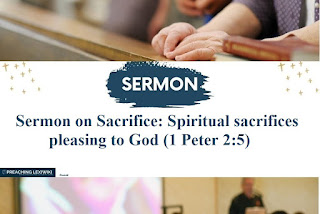"Spiritual Sacrifices Pleasing to God" (1 Peter 2:5)
- you also, like living stones, are being built into a spiritual house to be a holy priesthood, offering spiritual sacrifices acceptable to God through Jesus Christ. (1 Peter 2:5)
The concept of spiritual sacrifices that are pleasing to our heavenly Father. In 1 Peter 2:5, we are reminded that as believers, we are living stones, being built into a spiritual house for the purpose of offering spiritual sacrifices acceptable to God. What does it mean to offer such sacrifices, and how can we ensure they are truly pleasing to God? Let us dive into this vital topic and discover the principles behind these spiritual offerings.
-- Ads --
I. Sacrifice is Giving the Best to God (Matthew 6:33)
Our first point emphasizes that a sacrifice involves giving our best to God. In Matthew 6:33, Jesus reminds us to seek first the kingdom of God and His righteousness. When we offer spiritual sacrifices, we are dedicating our most valuable resources—our time, talents, and treasures—to the service of the Lord. True sacrifice is not about leftovers but about prioritizing God in our lives.
II. Sacrifice is Personal (Romans 12:1-2)
Romans 12:1-2 teaches us that true sacrifice is personal and transformative. We are called to present our bodies as living sacrifices, holy and acceptable to God. This means surrendering our entire being to Him, allowing His transformative power to renew our minds and hearts. A personal commitment to God is at the core of pleasing spiritual sacrifices.
III. Sacrifice is a "Smelling Savor to God," a Memorial (Philippians 4:18)
In Philippians 4:18, the Apostle Paul describes our offerings as a sweet-smelling aroma, a memorial that ascends to God. Our sacrifices are not just actions; they are expressions of love and devotion that touch the heart of God. They serve as reminders of our faithfulness and dedication to Him.
IV. Sacrifice Requires Attention to Detail (Colossians 3:17)
Colossians 3:17 reminds us that in all we do, whether in word or deed, we are to do it in the name of the Lord Jesus, giving thanks to God the Father. Our spiritual sacrifices require attention to detail and a commitment to honoring God in every aspect of our lives. Nothing is too small to be offered to God.
-- Ads --
V. Sacrifice Requires Continuous Work (Leviticus 24:1-9; 1 Corinthians 15:58)
Our final point emphasizes that sacrifice is not a one-time event but a continuous work. Just as the priests tended the lamps in the Tabernacle continuously (Leviticus 24:1-9), we are called to be steadfast and immovable in our service to God (1 Corinthians 15:58). Pleasing spiritual sacrifices require ongoing dedication, even in the face of challenges and difficulties.
VI. Sacrifice is a "Gift" to God (Hebrews 5:1; 8:3-4; 9:9)
In the Old Testament, the priesthood was tasked with offering various gifts and offerings on behalf of the people. These sacrifices symbolized their dedication to God and their desire for atonement. In our context, we no longer offer animal sacrifices, but we present ourselves as living sacrifices (Romans 12:1). Just as the priests of old brought their offerings to the altar, we bring the gift of our lives to God. It's an offering of ourselves, our time, our talents, and our resources as a token of our love and gratitude.
VII. Sacrifice is Serious and Sacred (Leviticus 17:1-9, 10-16; Hebrews 12:28-29)
The sacrificial system in the Old Testament was a serious and sacred matter. Leviticus 17 emphasizes the importance of offering sacrifices only at the designated place and to the true God. Similarly, our spiritual sacrifices must be approached with reverence and sincerity. Hebrews 12:28-29 reminds us that we are serving an unshakable Kingdom, and our worship should be characterized by awe and reverence. Our spiritual sacrifices are not to be taken lightly; they reflect our commitment to the unchanging God.
VIII. Sacrifice is a "Communion" with God and One Another (1 Corinthians 10:16-18; 11:18-34)
The Apostle Paul emphasizes the communal aspect of our spiritual sacrifices in 1 Corinthians. He speaks of our participation in the body and blood of Christ during the Lord's Supper. This sacred act symbolizes our communion with God and fellow believers. Our spiritual sacrifices are not solitary endeavors but opportunities for unity and fellowship. As we partake in these sacred moments together, we strengthen our bond with God and our brothers and sisters in Christ.
- Sermon on Psalm 121: Divine Protection
- Sermon on Women: Do You Want to Be Like Them?
- Sermon on 2 Chronicles 7:14 - The Prayer of God's People
- +100 Top Easy Sermons to Preach
Conclusion:
As living stones in God's spiritual house, we are called to offer spiritual sacrifices that are pleasing to our Creator. These sacrifices involve giving our best, personal commitment, attention to detail, and continuous effort. They are a sweet aroma to God, a memorial of our love and devotion.
Let us remember that our sacrifices, no matter how small or seemingly insignificant, have great value in the eyes of the Lord. May we be inspired to offer our lives as living sacrifices, fully committed to His service, knowing that our offerings are pleasing and acceptable in His sight.

